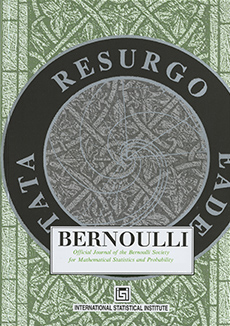Abstract
Consider a random walk $S_{i}=\xi_{1}+\cdots+\xi_{i}$, $i\in\mathbb{N}$, whose increments $\xi_{1},\xi_{2},\ldots$ are independent identically distributed random vectors in $\mathbb{R}^{d}$ such that $\xi_{1}$ has the same law as $-\xi_{1}$ and $\mathbb{P}[\xi_{1}\in H]=0$ for every affine hyperplane $H\subset\mathbb{R}^{d}$. Our main result is the distribution-free formula
\[\mathbb{E}\bigg[\sum_{1\leq i_{1}<\cdots<i_{k}\leq n}\mathbb{1}_{\{0\notin\operatorname{Conv}(S_{i_{1}},\ldots,S_{i_{k}})\}}\bigg]=2\binom{n}{k}\frac{B(k,d-1)+B(k,d-3)+\cdots}{2^{k}k!},\] where the $B(k,j)$’s are defined by their generating function $(t+1)(t+3)\ldots(t+2k-1)=\sum_{j=0}^{k}B(k,j)t^{j}$. The expected number of $k$-tuples above admits the following geometric interpretation: it is the expected number of $k$-dimensional faces of a randomly and uniformly sampled open Weyl chamber of type $B_{n}$ that are not intersected by a generic linear subspace $L\subset\mathbb{R}^{n}$ of codimension $d$. The case $d=1$ turns out to be equivalent to the classical discrete arcsine law for the number of positive terms in a one-dimensional random walk with continuous symmetric distribution of increments. We also prove similar results for random bridges with no central symmetry assumption required.
Citation
Zakhar Kabluchko. Vladislav Vysotsky. Dmitry Zaporozhets. "A multidimensional analogue of the arcsine law for the number of positive terms in a random walk." Bernoulli 25 (1) 521 - 548, February 2019. https://doi.org/10.3150/17-BEJ996
Information





